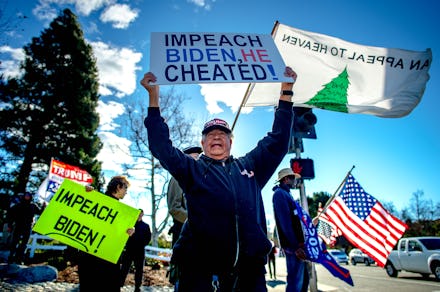Only 16% of Americans think democracy is functioning really well

Far be it for me to declare myself the ultimate arbiter of what's good or not, but when a plurality of Americans go on the record to say that democracy in this country is falling flat on its face — and crushing us underneath it in the process — I'm pretty comfortable going out on a limb to say that things sure seem "really bad."
According to a new poll from the Associated Press and NORC at the University of Chicago, nearly half of adults in the country believe democracy is not working well, compared to only 16% who said it was working very well. And while dissatisfaction with politics is hardly a new phenomenon, the polling data suggests a particularly partisan trend in recent months. Per AP:
In October, about two-thirds of those who identify with the GOP, 68%, said democracy was working at least somewhat well. That figure plummeted to 36% in January. Democratic views whipsawed in the opposite direction, with 70% reporting democracy working at least somewhat well compared with 37% in the fall.
The precipitous divergence can likely be traced in part to the usual shift in public sentiment inherent in any transition of power between one political party and another; Republicans are more inclined to be pessimistic when a Democratic administration is sworn in, and vice versa. (The poll showed a similar, albeit somewhat less dramatic, flip among Republicans and Democrats when asked whether America's best days are ahead or behind us.) But, as AP notes, in this case the bifurcated sense of faith in democracy can also be attributed to former President Donald Trump's explicit efforts to cast doubt onto the electoral process as a whole during his final months in office.
Which isn't to say the poll is all doom and gloom. While still underwater, Congress's overall approval rate is slowly increasing, and a surprising number of American adults agree on the principles that are important "to the U.S. identity as a nation," such as a fair judicial system, personal liberties, and the ability to achieve a (conspicuously undefined) "American dream" — all three of which polled at 80% or higher.
The fairly overwhelming agreement on what is important, coupled with the striking disagreement on whether those values are actually being enacted by those in power, is a perfect encapsulation of the largely partisan dysfunction that has pushed the United States into a position of intractable political gridlock. The only question left is: What, if anything, can bridge this widening divide?